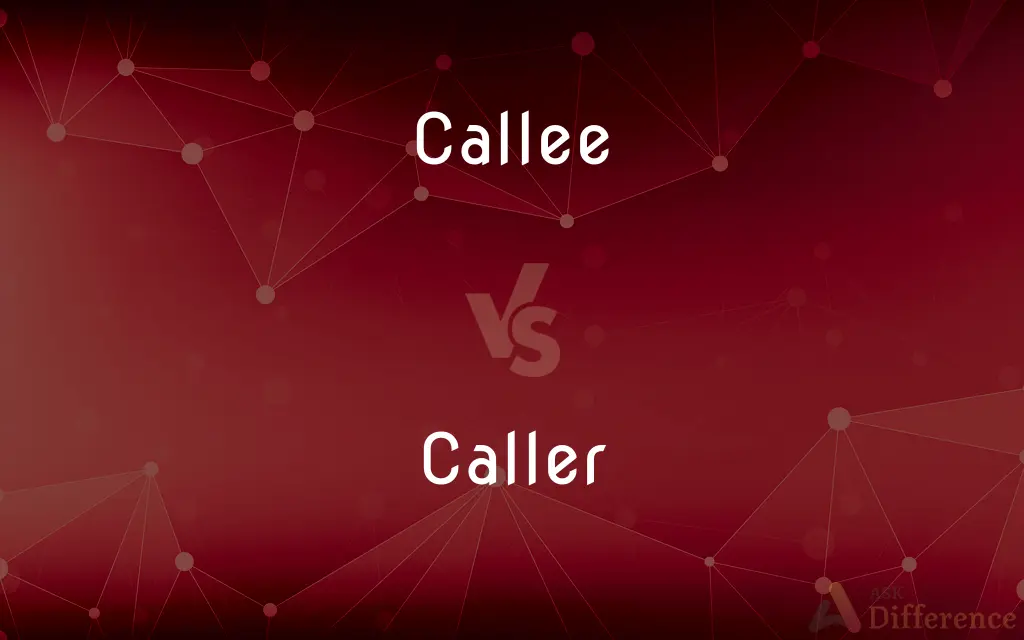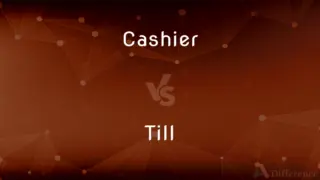Callee vs. Caller — What's the Difference?
By Urooj Arif & Fiza Rafique — Updated on April 3, 2024
A caller initiates a phone call or function call, while a callee is the party or function receiving the call.

Difference Between Callee and Caller
Table of Contents
ADVERTISEMENT
Key Differences
The caller is the entity that initiates the call, be it in telecommunications where one person dials another's number, or in programming where one function invokes another. This initiating action is crucial for establishing a connection or interaction. On the other hand, the callee is on the receiving end of this interaction, being the person who answers the phone call or the function that is called and executed in response.
In telecommunications, the caller is the one who bears the responsibility of initiating contact, often implying an immediate need or desire to communicate. Whereas the callee, upon receiving the call, has the option to accept or reject this attempt at communication, giving them a certain degree of control over the interaction.
From a programming perspective, the caller function depends on the callee for completing a specific task or operation. This relationship illustrates a direct dependency, where the caller requires the execution of the callee to proceed further. Conversely, the callee might be designed to perform its task without needing specific details about the caller, highlighting an interesting aspect of encapsulation and modularity in software development.
The concept of caller and callee also extends to the legal and emergency services realms, where the caller is the one reporting an incident or seeking assistance, and the callee (e.g., emergency services, help desk) provides the necessary help or information. Here, the roles are defined by the nature of assistance required and offered.
In terms of privacy and anonymity, the caller may have the ability to hide their identity (caller ID blocking), creating a scenario where the callee must decide whether to engage with an unknown party. This adds an additional layer of decision-making for the callee based on the information (or lack thereof) provided by the caller.
ADVERTISEMENT
Comparison Chart
Role
Receives the call
Initiates the call
In Telecommunications
Answers or rejects the incoming call
Dials the number to start communication
In Programming
The function that gets executed
Invokes another function
Dependency
May not need to know about the caller
Depends on callee for certain actions
Control
Controls the response to the initiation
Has the initiative to start the interaction
Compare with Definitions
Callee
The person or system receiving a telephone call.
She was the callee who answered the urgent call.
Caller
In programming, the function that invokes another function.
The main() function is the caller of the subroutine.
Callee
In programming, the function that is called and executed.
The print() function acts as a callee when invoked.
Caller
The side that initiates a process or event.
The caller in the negotiation process made the first offer.
Callee
The entity providing a response or information.
The callee on the help line provided the necessary instructions.
Caller
The person or system initiating a telephone call.
As the caller, he dialed the number to report the issue.
Callee
The side that responds to a process or event initiation.
The callee in the negotiation was quick to respond with a counter-offer.
Caller
The entity making a request or seeking information.
The caller to the help desk asked for technical support.
Callee
Receives communication or action.
The callee at the door greeted the visitors warmly.
Caller
Initiates communication or action.
The caller rang the doorbell of the house.
Callee
(telephony) The person who is called by the caller (on the telephone).
Caller
Cool and refreshing.
Callee
(programming) A function called by another.
Caller
One that calls, especially a party placing a telephone call.
Caller
A person paying a short social visit.
Caller
A person who calls out numbers or directions, as at a bingo game or a square dance.
Caller
Fresh.
Caller
(telephony) The person who makes a telephone call.
- I've got someone on the line.
- Who's the caller?
- Who's the caller?
Caller
A visitor.
A gentleman caller
Caller
(bingo) The person who stands at the front of the hall and announces the numbers.
Caller
(programming) A function that calls another (the callee).
Caller
A whistle or similar item used to call foxes.
Caller
(dance) The person who directs dancers in certain dances, such as American line dances and square dances.
Caller
One who calls.
Caller
Cool; refreshing; fresh; as, a caller day; the caller air.
Caller
Fresh; in good condition; as, caller berrings.
Caller
A social or business visitor;
The room was a mess because he hadn't expected company
Caller
An investor who buys a call option
Caller
The bettor in a card game who matches the bet and calls for a show of hands
Caller
A person who announces the changes of steps during a dance;
You need a fiddler and a caller for country dancing
Caller
Someone who proclaims or summons in a loud voice;
The callers were mothers summoning their children home for dinner
Caller
The person who convenes a meeting;
Who is the caller of this meeting?
Caller
The person initiating a telephone call;
There were so many callers that he finally disconnected the telephone
Caller
Providing coolness;
A cooling breeze
`caller' is a Scottish term as in `a caller breeze'
Caller
Fresh;
Caller fish
Common Curiosities
What defines a caller in a communication process?
A caller is the party that initiates the communication or call, whether it's a telephone call or a function call in programming.
What is the significance of the caller in emergency services?
In emergency services, the caller is the one reporting an incident or seeking help, playing a critical role in initiating timely assistance.
Who is considered the callee?
The callee is the party or function that receives the call or request for action from the caller.
Can the roles of caller and callee change?
Yes, the roles can change depending on the direction of the communication; for instance, a callee can become a caller if they initiate a subsequent communication.
How does anonymity affect the caller-callee relationship?
Anonymity, especially in telecommunications, can affect the callee's willingness to respond, as they might be cautious about unknown or hidden caller IDs.
Is there a power dynamic between the caller and callee?
Yes, there's a power dynamic where the caller initiates contact, suggesting a need or desire for interaction, while the callee has the power to accept or reject the communication.
Do callers always need specific information from callees?
In many cases, callers seek specific information or actions from callees, but not always; the interaction can sometimes be for casual communication.
How do caller and callee interact in programming?
The caller function invokes the callee function, relying on it to perform a specific task or operation within the program.
How does the caller-callee model apply in customer service?
In customer service, the caller is usually seeking assistance or information, while the service provider (callee) offers the required support.
How do emergency services handle anonymous callers?
Emergency services have protocols for handling anonymous callers, focusing on providing assistance while trying to ascertain necessary details for help.
How are caller and callee roles established in a conference call?
In a conference call, the initiator of the call is the primary caller, while participants are callees, though the dynamic can shift as participants engage in the conversation.
How do privacy settings impact the caller and callee?
Privacy settings, like caller ID blocking, can impact the interaction by making the callee more cautious about responding to unknown or hidden numbers.
Can both parties be anonymous?
In certain communication systems, yes, both parties can choose to remain anonymous, affecting the trust and openness of the interaction.
Can a callee refuse a call from a caller?
Yes, a callee can refuse a call from a caller, either by not answering or by utilizing features that block certain calls.
What role does technology play in the caller-callee dynamic?
Technology, especially in telecommunications and programming, defines and facilitates the roles and interactions between callers and callees.
Share Your Discovery

Previous Comparison
Cashier vs. Till
Next Comparison
Flugelhorn vs. MellophoneAuthor Spotlight
Written by
Urooj ArifUrooj is a skilled content writer at Ask Difference, known for her exceptional ability to simplify complex topics into engaging and informative content. With a passion for research and a flair for clear, concise writing, she consistently delivers articles that resonate with our diverse audience.
Co-written by
Fiza RafiqueFiza Rafique is a skilled content writer at AskDifference.com, where she meticulously refines and enhances written pieces. Drawing from her vast editorial expertise, Fiza ensures clarity, accuracy, and precision in every article. Passionate about language, she continually seeks to elevate the quality of content for readers worldwide.














































